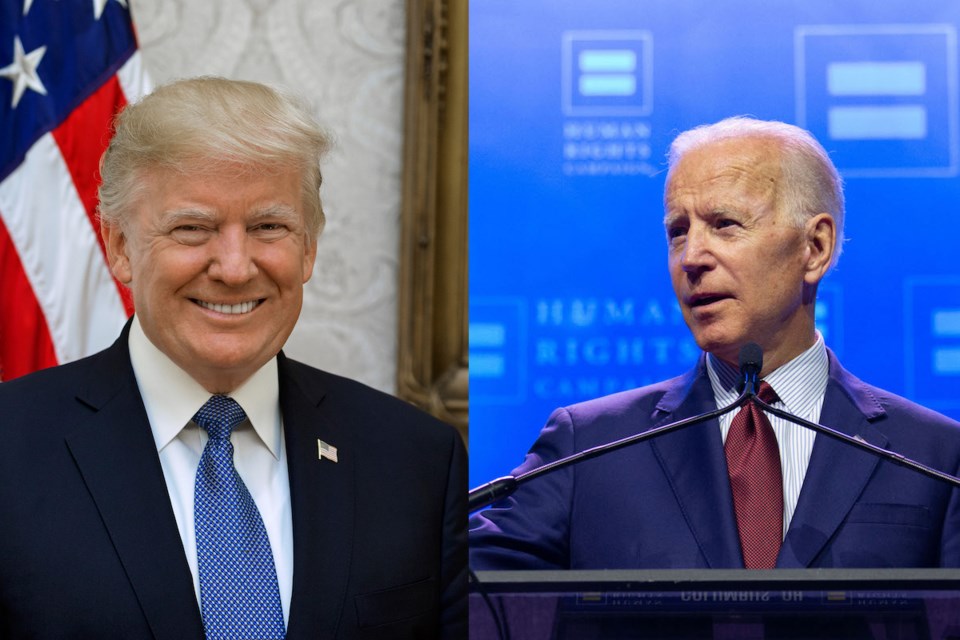That’s two straight American presidential elections the pollsters have gotten wrong, says Georgian College political science teacher Geoffrey Booth.
Democratic candidate Joe Biden’s six to 10 per cent lead — in several polls — has all but evaporated into a dead heat with Republican President Donald Trump in an election which might not be settled for days.
Approximately the same thing happened to Hillary Clinton’s lead against Trump four years ago.
“I was skeptically hopeful that the polls would get it right… but that’s the second time that they’ve got this wrong,” Booth said Wednesday.
“We’ve seen similar incidents in Canadian politics, but I thought because of what happened in 2016, that they would have drilled down more to make sure that what they were seeing was actually what was happening on the ground," he added. "But some of the initial reactions to polls versus exit polls, there’s a total discrepancy.
“I think that maybe the Biden campaign just got the warm, fuzzy feeling that the polls were going to be accurate this time.”
Booth cited support for Trump among Latino males, by black men and women, groups of people that have seen what this president can do, what he has unleashed in U.S. politics that has disproportionately affected them negatively, including COVID-19, which has killed more than 230,000 Americans.
“There’s something more fundamental here,” he said. “I think it really does speak to an inability of the electorate at large to cope with the reality that faces everybody.
“You’d think the coronavirus would have (politically) killed that guy (Trump) in the water, dead, right?” Booth said. “And yet he has managed to turn the whole thing into a team sport. You know, wear my jersey, everything’s fine and so he’s realized now he can basically say anything and his base will follow him, regardless.
"But all of those others — the moderates, the skeptics, the independents, the undecided, the ones who voted for him in 2016, but really don’t like what they see — there’s something very warm and comforting about the vision that he paints," said Booth.
“And that vision is ‘don’t worry about it, right, stay on the team and all the rest of this stuff will go away. It’s us against them’. It’s not about morality, it’s not about right or wrong, it’s about whether you’re going to wear the team jersey or not.”
What also struck Booth was Trump’s strategy of having four rallies in Pennsylvania on Monday, the day before the election. He said that depending on how that math breaks, if Trump takes Georgia and North Carolina, and Biden takes Nevada and Arizona, then it could come down to those Rust Belt states: Pennsylvania, Wisconsin and Michigan.
“You’d have to feel pretty good about your chances if you’re a Trump supporter,” Booth said. “He’s been there four times in one day versus Biden, who’s born in Pennsylvania.”
But there are other reasons why America’s presidential election is a stalemate.
“I think it’s just this creeping inability of average Joes, people who sort of are tuned in but aren’t… they don’t want to have to sit down and pore over this stuff and talk about it. They just want a drink and a quick decision,” he said. “And Trump has as much said that (Tuesday) night. ‘It’s over, I won and let’s move on’.”
And if this dead heat isn’t troubling enough, what about Trump’s looming court challenge to the election results if he doesn’t win?
Booth says he has less fear for that because Trump would need hard evidence to make his case.
“Trump can do nothing if… in a perfect world, the votes all get counted and there’s no fraud, there’s no case to make, nobody found the 10,000 ballots in the garbage can. He has nothing to bring (to court),” he said.
But there’s also a possibility that this won’t matter.
“All he has to do is say it. If he says it, and the team hears him say ‘Hey, there’s been fraud,' well, it’s a way more convenient way, first of all for him to avoid blame, but it’s also a way for him to say ‘Look, this is only reason I could have lost’,” Booth said.
Whatever its final result, the 2020 American election has shown the deep divide of its people.
“It really doesn’t matter, at the end of the day, who wins this,” Booth said. “I’m sad to say that polarization is alive and well. It’s not going away and I’d say it’s even worse.”
Electoral College at a glance
Americans voting for the next U.S. president — Trump or Biden — are actually casting ballots for a representative of that candidate’s party called an elector. These 538 electors then vote for president on behalf of people in their state.
A majority of 270 of these votes is required to win the American presidency.
The Electoral College almost always uses the winner-take-all system; candidates with the most votes in a state claim all of that state’s electoral votes. So winning California, which has 55 electoral votes, is more important than winning Hawaii, which has four.
Each American state is assigned a certain number of electoral votes based on their number of congressional districts, plus two additional votes representing their Senate seats. Washington, D.C., gets three electoral votes, despite having no voting representative in Congress (the House of Representatives and the Senate).
The House of Representatives has 435 members and elections every two years, including 2020.
The Senate has 100 members who serve six-year terms, with about one-third of them elected every two years. This year there are 35 Senate races this year.
